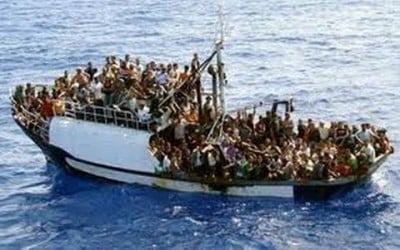
At a meeting in Amsterdam this week, European interior and justice ministers sought to outdo each other with suggestions as to how the influx of desperate refugees from the Middle East could be stopped. No measure was too brutal for consideration.
Proposals ranged from the hermetic sealing off of borders to the stationing of Frontex troops, even against the will of national governments, as well as the erection of concentration camps for hundreds of thousands of refugees.
Greece came under sustained attack from several ministers who called for its expulsion from the Schengen zone, which guarantees free movement within the European Union, if Athens did not reduce the number of refugees transiting the country into Europe.
A large proportion of the refugees from the Middle East risk the dangerous and often deadly journey from Turkey to the Greek islands close by before crossing Greece and leaving the EU at the Macedonian border. After travelling through Macedonia and Serbia, they enter the EU again through Hungary, Croatia and Slovenia, with many seeking access to Germany.
Despite freezing winter weather and rough seas, up to 2,000 refugees are still crossing the Aegean Sea daily to the Greek islands. According to EU figures, by January 23, 44,000 people had already reached Europe from Turkey in this way in 2016. The number of refugees counted as dead or missing was 149. During the night of January 22 alone, 42 people drowned trying to make the journey, including 18 children.
This route is to be shut down. Ministers demanded a significant strengthening of Greece’s northern border with Macedonia by Frontex forces, and agreed to strengthen the border controls within the Schengen zone until the end of 2017.
Greece was given an ultimatum to restrict the number of refugees or face expulsion from the Schengen zone. German Interior Minister Thomas de Maizière said after the meeting, “We require a permanent, noticeable and sustained reduction of the numbers of refugees, and this must be visible in the coming weeks.”
It must be made clear, de Maizière continued, that the border protection agency Frontex could act in place of a member state to secure the border. Germany’s interior minister did not exclude the expulsion of Greece from the Schengen zone. “We will put pressure on Greece to do its homework,” he threatened.
Theo Francken, Belgium’s state secretary for asylum and immigration, raised the possibility of a “closed facility” in Greece for 300,000 refugees. It would have to be under EU administration, because Greece’s “state structures [were] obviously too weak,” the Belgian politician said.
Francken’s proposal amounts the transformation of Greece into a giant concentration camp, with the creation of a ghetto for refugees on the scale of a medium-sized city. Nothing comparable has been seen in Europe since the end of the Nazi era.
Sealing the Macedonia-Greece border with assistance from Frontex forces was supported by Hungarian Prime Minister Victor Orban, who for months has been demanding the establishment of a massive border fence on Greece’s northern border. Slovakian Prime Minister Robert Fico also gave his backing. According to a report by Der Spiegel magazine, Hungary, the Czech Republic and Slovakia have already deployed their own police forces to this border and Hungary has supplied extensive materials for the construction of a permanent fence.
On Tuesday, the Danish parliament passed legislation to confiscate asylum seekers’ valuables. Police will now be able to seize assets from refugees worth more than 10,000 kroner (€1,340) to cover housing and food costs. The original proposal was to confiscate everything above the value of 3,000 kronor. In addition, the period migrants will have to wait before applying for relatives to join them will be extended from one year to three, temporary residence permits will be shortened and the conditions for obtaining a permanent permit toughened.
With comparisons being made to measures taken against Jews during World War II, the Danish government responded by explaining that this was how unemployed Danish citizens were already treated! Denmark is, however, far from alone in taking such fascistic measures.
Switzerland seized assets from 100 people in 2015 under rules similar to Denmark’s, but set even lower at €900. Southern states in Germany are already implementing similar measures, with Bavaria confiscating all property in excess of €750 and Baden-Württemberg in excess of just €350.
The Syriza government in Greece has already done the bidding of the EU in imposing savage austerity measures against working people. It is now being told to act with similar brutality against refugees.
Greek Immigration Minister Ioannis Mouzalas responded by declaring that some EU members were of the opinion that the refugees should drown, while Foreign Minister Nikos Kotzias made clear he understood what was expected when he complained to Germany’s TAZ newspaper, “If we want to stop the refugees, we would have to wage war against them. We would have to bombard them, sink their boats and let the people drown.”
The crossing of the Greece-Macedonia border is already a traumatic experience for refugees. Immigrants are regularly bullied and beaten by the police. A recent report from the German refugee support organisation ProAsyl showed that the sealing of borders in the Balkans had destructive and even deadly consequences for refugees. The Amsterdam meeting made clear that this outcome is desired and in line with the methods being considered.
According to the report, tens of thousands of refugees are already being sent back to Greece from Macedonia, where they are left with nothing and forced to live on the streets.
In Athens itself it is almost impossible to register as an asylum seeker. The United Nations High Commissioner for Refugees was aware of only 1,150 accommodation places in Athens for an average of 10,000 asylum applications per year. Those who do not register an asylum claim risk being arrested and detained in a Greek deportation camp.
Athens has blamed the government in Ankara for the number of people crossing the Aegean Sea, while the Turkish government has declared that it does not have the capabilities to secure the entire coast. The EU has been trying for some time to encourage Turkish cooperation in the refugee question and has promised €3 billion in aid, which has yet to be paid.
There are currently 2.5 million people in Turkey who have fled the wars in the Middle East and North Africa. Only around 250,000 of these are in already existing camps. Turkey does not fully recognise the Geneva Refugee Convention and refugees cannot work there or send their children to school.
Millions of people in Europe today are superfluous and unwelcome. Politicians and journalists are discussing openly how best refugees can be deterred, detained, channelled and pushed from one place to another, as if they were discussing animals or freight. They are, in fact, conspiring against people who see flight as the only way out of the misery created by imperialist wars carried out by the US and its European allies that have devastated the Middle East, Central Asia and North Africa.
Source Article from http://www.globalresearch.ca/european-governments-step-up-offensive-against-refugees/5504330
Views: 0
 RSS Feed
RSS Feed

















 January 28th, 2016
January 28th, 2016  Awake Goy
Awake Goy 
 Posted in
Posted in  Tags:
Tags: 
















